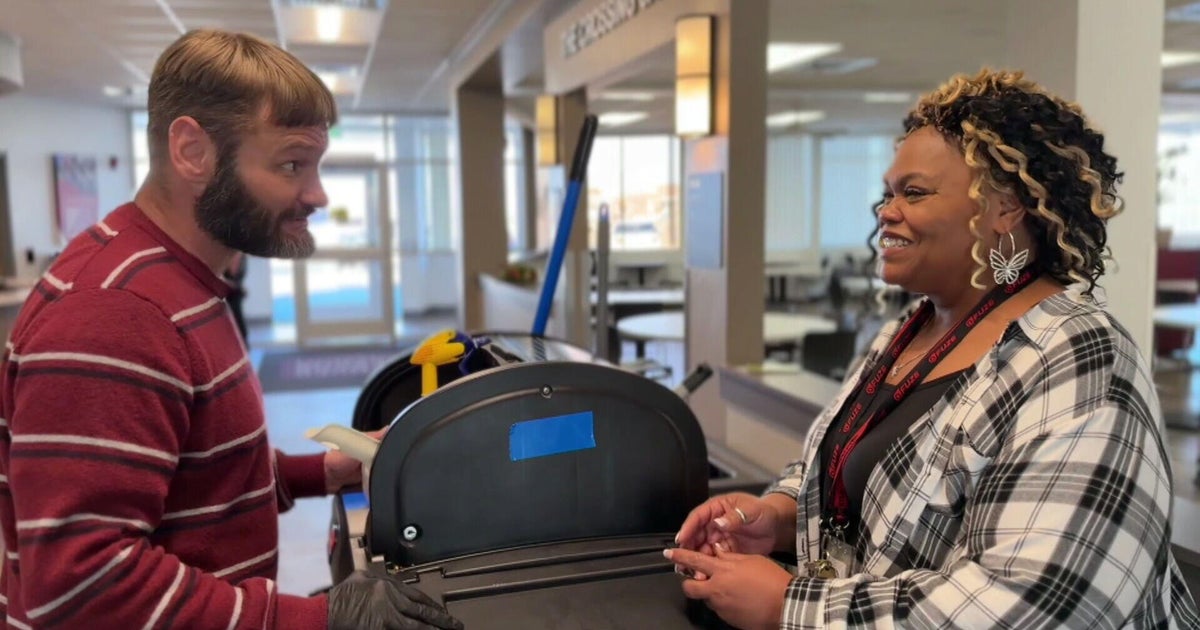Third stimulus check: When could you get a $1,400 check?
President Joe Biden's $1.9 trillion coronavirus relief plan proposes a third round of stimulus checks of $1,400 for most Americans. Yet while that could extend a helping hand to millions of households still suffering from the pandemic's economic fallout, it could be weeks until the payments arrive, analysts say.
The price tag for the relief package, called the American Rescue Plan, faces pushback from some Republican lawmakers, who last year resisted Democratic efforts to pass a $2 trillion bill. Heights Securities analyst Hunter Hammond expects a final package could be passed in the first quarter and range from $1.5 to $2.2 trillion.
On February 1, a group of 10 Republican lawmakers unveiled an alternative stimulus plan that would scale back the checks to $1,000 per adult and lower the income cap for receiving payment. That plan would cut the cost of a third stimulus check to $220 billion, compared with $600 billion under Mr. Biden's more generous package.
But Democrats aren't waiting for Republican support. The Senate early passed a budget resolution, a key step for the Democratic-controlled Congress to more forward with Mr. Biden's $1.9 trillion relief proposal without any Republican votes. Among the amendments approved was a bipartisan plan introduced by Democratic Senator Joe Manchin and Republican Senator Susan Collins to block "upper income citizens" from the next round of stimulus checks. The amendment doesn't define "upper income."
"Congress is pushing forward on a Democrat-only $1.9 trillion stimulus package in an attempt to strike while the iron is hot, and we expect this effort to succeed," noted Hunter Hammond, an analyst with Heights Securities, in a February 5 research note.
Mr. Biden has expressed a willingness to negotiate, with the president saying he would insist on $1,400 checks but suggesting he was open to targeting the checks to people who need the most help.
Depending on how the talks play out, that could result in fewer Americans getting a check. The Washington Post reported that Democrats may lower the income threshold to qualify for a payment to single people who earn $50,000 or less and married couples with income of $100,000 or less.
In two previous rounds of checks, the income caps to get a check were $75,000 for single earners and $150,000 for married couples, with the payments reduced for incomes above those thresholds until the payments phased out entirely at higher incomes.
The Democrats' parliamentary maneuver, called budget reconciliation, requires only a majority vote for legislation to become law, though it can delay passage.
Many Democrats are arguing for a large stimulus package, pointing to renewed economic distress in recent months as the pandemic worsens. The January jobs report indicated subdued hiring, with employers adding a modest 49,000 jobs. White-collar services leading the gains as lower-paid service jobs continued to suffer.
"It may look good, but it ain't," wrote Oxford Economics economist Lydia Boussour in a February 5 research note. "The labor market recovery remained stuck in a rut in January as the pandemic's winter surge weighed on hiring."
The labor market isn't likely to return to pre-pandemic levels until 2024, according to a February 1 report from the Congressional Budget Office. The U.S. economy shrank 3.5% last year, its largest annual decline in 74 years, government data shows.
"Last year was the worst year for the U.S. economy since World War II — that alone should send a very powerful message to Senators who are getting ready to debate COVID legislation, and caution them against going small," Senator Ron Wyden, a Democrat from Oregon, said in a January 28 conference call with reporters.
Wyden said that he would like to see the next relief bill passed at least a week prior to the March 14 expiration of expanded unemployment benefits, which include an extra $300 in weekly jobless aid. "I'm not going to let jobless workers fall off a cliff again," Wyden said, referring to the expiration of additional jobless aid from two prior relief packages.
Meanwhile, Senate Majority Leader Chuck Schumer of New York said he, too, is aiming to pass the next round of stimulus aid by mid-March, according to Bloomberg News.
What's holding up new stimulus checks?
Chief among the issues are whether Republican lawmakers would support the package. But with GOP support so far failing to materialize, Democrats are pushing forward with the budget reconciliation process, which would next direct House and Senate committees to discuss spending priorities.
"When Congress colors in the details of the stimulus package, investors should expect some deviation from the original Biden plan, as even a Congress closely in sync with the president will look to put their own imprint on the bill," Hammond wrote in a February 2 research note.
Janet Yellen, who on January 25 was confirmed as Mr. Biden's Treasury secretary, said last month during Congressional testimony that the new administration would focus on winning quick passage of its $1.9 trillion pandemic relief plan. Yellen argued that additional stimulus measures, including Mr. Biden's proposal for a $15 minimum wage, were necessary to prevent economic "scarring due to this pandemic."
The plan to provide more direct aid to low- and middle-class households could help lift GDP by 0.7%, although other measures in the bill — such as a higher minimum wage and aid to states — could boost GDP growth by 1.5%, according to a January 18 report from Oxford Economics Chief U.S. Economist Gregory Daco. He's predicting a $1.3 trillion stimulus package will be approved before the end of March.
"The additional stimulus will be welcome given the extent of labor market damage, with still 10 million fewer jobs than before the pandemic," he and Oxford Economics lead U.S. economist Lydia Boussour wrote on January 22.
Here's what analysts are predicting about the $1,400 checks and other spending proposals.
Are the $1,400 checks a done deal?
Not yet, because there's increasing debate about whether the checks should be targeted to lower-income households, including among some Democrats. Said Paul Ashworth in a note to investors:
"There is still uncertainty whether all the Senate Democrats will support President Joe Biden's full plan, with Joe Manchin already expressing doubts about the need to send $1,400 stimulus cheques to those that might not need the money and warning that he wouldn't support a rise in the minimum wage to $15 per hour by 2025, roughly double what it is now."
The latest GOP proposal would lower the payment to $1,000, which would be paid to single people earning up to $40,000 and married couples with income up to $80,000. The payment amounts would would decrease incrementally by income level until cutting off entirely for single people earning over $50,000 and married couples earning more than $100,000.
But the GOP plan isn't likely to move forward, given the Democrats push to advance Mr. Biden's $1.9 trillion package. There's an 85% chance a scaled-down package will be passed in the first three months of 2021, predicts Height Securities' Hammond. Because of the ongoing support for additional direct aid to households, checks are likely to be included in that smaller package, analysts say.
When would I get a third stimulus check?
Whatever the size, it's looking like another round of stimulus checks may not land in bank accounts until mid- or late March, based on Schumer's time frame. The new Senate Majority leader acknowledged "that the next round of fiscal stimulus remains a month to 6 weeks away," Hammond noted on January 26.
After the relief bill passes Congress, it must be signed by the president. After that, the IRS would distribute funds through direct deposit, mailed checks and prepaid debit cards. If a package is passed by the end of March, people might get their checks starting by early April.
In the first stimulus payments in April 2020, which directed $1,200 to eligible adults as well as $500 per child, it typically took two weeks to several months for payments to reach people. The second round of checks, which sent $600 to each eligible adult and child, required about a week for the funds to arrive via direct deposit.
But in some cases people experienced delays in receiving the money due to problems with their account information. President Biden signed an order on January 22 directing the Treasury to streamline the delivery of stimulus checks for those who have not yet received their direct payments from previous rounds.
Would more people qualify for a check?
Millions more Americans could qualify for a check if Mr. Biden's plan is passed as he originally envisioned. One of his goals is to expand the payments to adult dependents, who were excluded from the first two rounds of checks.
That exclusion meant college students who are claimed as dependents on their parents' taxes, as well as disabled adults who are claimed as dependents, didn't qualify for checks. Because the two previous relief checks defined a child as someone younger than 17 years, they also excluded high school students who are 17 or 18. Mr. Biden's plan would extend the payments to older teenagers.
However, Mr. Biden's seeming willingness to target the checks to lower-income households could drastically reduce the number of households that would qualify for a check. For instance, the IRS said it sent 30 million payments to households earning more than $75,000 during the first round of stimulus checks. Under the income thresholds reported by the Washington Post — $50,000 for single earners and $100,000 for married couples — it's likely many of those households wouldn't qualify for the full $1,400 check.
Do Americans really need the money?
Signs point to millions of households facing rising financial hardship as the pandemic worsens, which is causing some businesses to lay off staff and cut back hours.
In December, hiring around the U.S. fell for the first time in seven months, as the virus weighed especially hard on restaurants, bars and other service-related businesses. The financial need is greatest among lower-income households, with new research finding that families earning less than $78,000 spent the latest $600 stimulus checks quickly. But households earning more than $78,000 have largely socked away the $600 payments, according to a study from the Opportunity Insights Economic Tracker, a nonprofit research group led by Harvard economics professor Raj Chetty.
Yet almost half of households with incomes above $150,000 said they needed the stimulus checks for financial stability, according to a recent survey from Credit Karma. Almost 6 in 10 of all U.S. households are facing financial hardship, TransUnion found in a November survey.
The additional stimulus funds "will be essential to the financial stability of many Americans, including those who appear to be higher earners," Colleen McCreary, chief people officer at Credit Karma, told CBS MoneyWatch. "As the pandemic drags on, Americans are continuing to feel the financial crunch."
A new survey from Bankrate.com found that more than half of Americans said the second stimulus check of $600 per person won't last them longer than a month. Most said they would use the money to pay household bills and day-to-day essentials.
Overall, Mr. Biden's stimulus plan would amount to roughly $3,500 per household, according to Oxford Economics. In other measures to support workers and help prop up the economy, he also wants to increase enhanced unemployment benefits to $400 a week through much of 2021 and has called for raising the federal minimum wage to $15 an hour.
The pay floor, now $7.25 an hour, hasn't been lifted since 2009, although many states and cities around the U.S. have boosted the local minimum wage in the years since.
—With reporting from the Associated Press.



